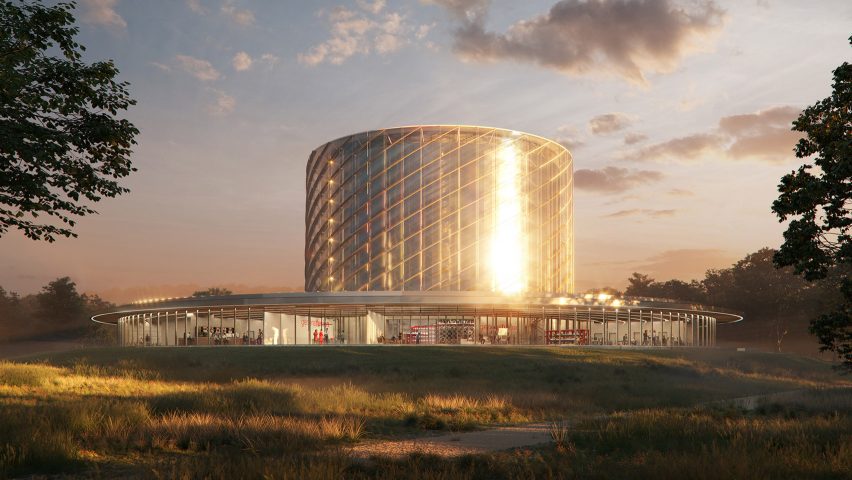A prototype power plant designed by architect Amanda Levete's firm AL_A with a nuclear fusion reactor is set to be built in Oxfordshire, England.
Located on the UK Atomic Energy Authority's (UKAEA) campus in Culham, the Fusion Demonstration Plant will be used to prove the viability of Canadian energy company General Fusion's nuclear fusion technology as a carbon-free energy source.
A_LA said it will be the world's first nuclear power plant of its kind upon completion in 2025.
"We have really enjoyed working with General Fusion and their team of scientists on the design of the Fusion Demonstration Plant, and are particularly excited that the first of its kind will be built in the UK," the studio told Dezeen.
"This is a real statement of confidence in science and technology and its role in building our future. We look forward to continuing our work with General Fusion and UKAEA."
Nuclear fusion mimics how stars creates energy
In new visuals released by A_LA, the Fusion Demonstration Plant is shown as a circular building with a reactor wrapped by a viewing gallery at its centre.
Alongside it will be meeting rooms and educational spaces to cater to visits from scientists, politicians, investors and the public.
The fusion technology in its reactor will be used to combine atoms to generate heat, mimicking the way that the sun and stars create energy. This is different to traditional nuclear power stations in which atoms are split in two – a process called fission.
General Fusion specifically uses magnetised target fusion (MTF). This involves the injection of hydrogen plasma into a sphere of molten lead-lithium surrounded by pistons. The pistons compress the hydrogen until its atoms slam together and fuse to form helium.
This process creates a huge amount of heat that is transferred by the liquid metal to boil water, make steam and spin a turbine to generate electricity.
However, as the plant will be 70 per cent of the size needed for a commercial power plant, it will not actually be used to generate power.
MTF could help decarbonise power grids
As MTF only requires hydrogen as a fuel and its main waste product is helium, the Fusion Demonstration Plant demonstrates a carbon-free way to create electricity.
This means that if it proves to be viable, it could help play a key role in decarbonising the UK's power grid, which remains heavily reliant on burning fossil fuels.
Another benefit of using nuclear fusion to create electricity is that it creates very little radioactive waste when compared to traditional nuclear power plants that rely on fission.
"Fusion energy is inherently safe, with zero possibility of a meltdown scenario," explained General Fusion when the Fusion Demonstration Plant proposal was first revealed in 2020.
Fusion is a "limitless, low-carbon energy" source
The UK government has been investing in fusion technology over the past decade in the hope it could play a part in making the UK net-zero by 2050.
"This new plant by General Fusion is a huge boost for our plans to develop a fusion industry in the UK, and I'm thrilled that Culham will be home to such a cutting-edge and potentially transformative project," said science minister Amanda Solloway.
"Fusion energy has great potential as a source of limitless, low-carbon energy, and today's announcement is a clear vote of confidence in the region and the UK's status as a global science superpower."
However, the International Energy Agency recently said achieving net-zero by 2050 will be the "greatest challenge humankind has ever faced" and that many government pledges "fall well short" of what is required.
Another groundbreaking power plant proposal that was recently in the spotlight is the world's first solar power station in space, which China is developing to provide "inexhaustible clean energy".
Elsewhere, BIG recently completed the "cleanest waste-to-energy power plant in the world", which is topped by an artificial ski slope. It is capable of converting 440,000 tons of waste into clean energy annually.
The visuals are by AL_A.

